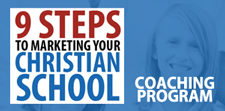
No one likes to sit on the bench.
Few like to always be the understudy.
Who likes to feel like just a number in a large crowd?
When I work 1-on-1 with Christian schools around the country, we always try to nail down the target market’s “need, problem, pain, frustration, or fear”. It is crucial to know your audience’s “pain point” so you can showcase how your school can meet that need, alleviate the problem or pain or be the answer to a parent’s frustration or fear about educating their children.
If you know your target market well, there are often some common needs, problems, pains, frustrations, and fears. As the title suggests (with all of its alliterational glory), these pain points normally center around the 3 Ps:
- PLAY – a Dad might investigate a school’s athletic program, because his daughter did not make the A-team (or even the B-team) at the large public middle school, not because of a lack of talent, but because she was competing with so many other athletes (and some of them may have played organized sports for years and spend thousands of dollars on private lessons or leagues). This Dad simply wants to see his daughter play volleyball. Dad might also be thinking about the missed scholarship offers if she sits on the bench at the school she’s at now. However, more than anything, he just wants to watch his daughter enjoy the competitive nature of sports.
- PERFORM – in some larger schools, the competition in the arts is so fierce that Travis’ love for band wanes until he drops out. Or consider the scenario where Shelly has dreamt her whole life of high school theater only to not make the cut because the theater director can only select a couple of lead roles out of hundreds who audition. In the end, students want to perform but some school situations do not allow it. Mom and Dad are disappointed as well.
- PARTICIPATE – while the number of clubs and organizations at larger schools sometimes dwarfs the opportunities at smaller institutions, the same thing is happening in areas where students can participate in student leadership roles. The sheer number of candidates or potential officers (plus the increased likelihood of playground politics in a larger school) makes it near impossible for a parent’s child, gifted in leadership and administration, to participate. Or a student looks at his StuCo and decide it’s more of a popularity contest than actual government, so he doesn’t even bother. But what if the smaller Christian school nearby provides the perfect opportunity and size to allow Stephen to exercise and develop his leadership gifts? What if he actually learns how to lead and serve the student body and the community around? Wouldn’t that look better to potential colleges than sitting out StuCo at the larger public school?
While no school should promise a parent “if you come to school here, she will be a starter”, it is OK to note the opportunities to play. You may want to cite evidence of other families who were at the same school as this Dad and note the similarities and what has changed since arriving at your school. Do you have a student-athlete that did not get to play at the large school and after transferring to your school, not only played but received a college scholarship? That may not be the norm, but it is important to note. Parents do not want to feel that they are “settling” for a lower-quality athletic program, so ensure that you properly point out the team successes and individual player successes over the years on the court or field. And certainly, feature the coach(es) and how your smaller school offers a chance for more of a coach/mentor relationship with his/her student-athletes. Make a video about your coach’s “philosophy of sports” and this will likely present a start contrast to other larger schools.
Testimonies from parents and student are crucial to making the compelling case that, while the number of offerings might be less, the quality and opportunities are better. Consistently display a body of evidence that shows that students play, perform and participate in a variety of character-building, leadership-developing and skill-enhancing activities.
Parents are examining the choices available for their promising kids – what evidence are you providing that your school is the best choice?
Buffer








